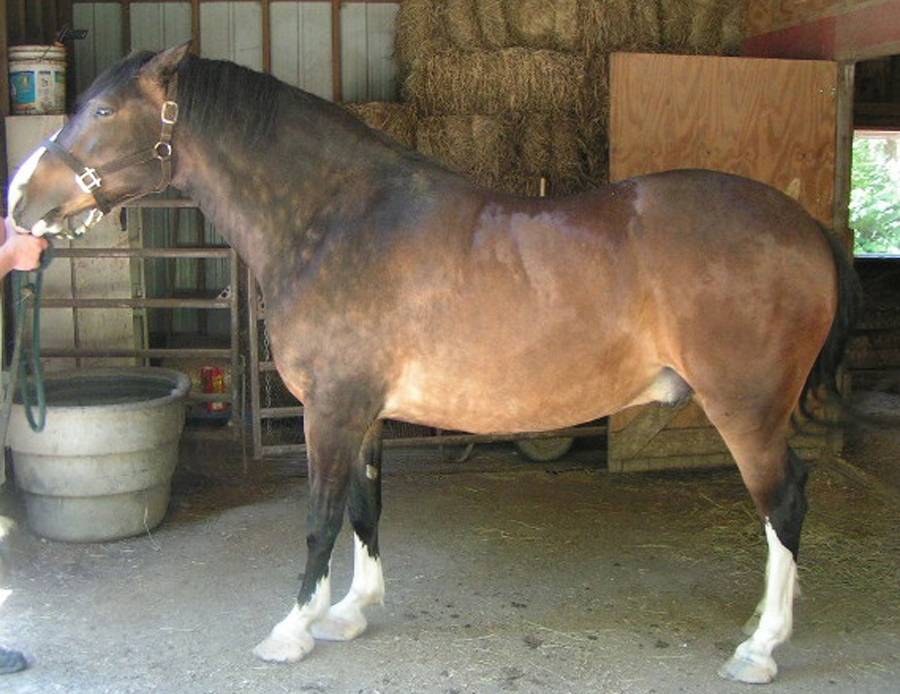Calorie Restriction Will Not Keep or Make Your Insulin Resistant Horse Fat - Eating Too Much Will
07/24/2017

Eleanor M. Kellon, VMD
Following your gut instinct is good advice in some situations, but gut, and even good old common sense, can also be wrong. This is where fact and science come in.
Correctly caring for a horse with Insulin Resistance (IR) takes some major lifestyle changes. It is up to the caretaker to implement those changes. This can be a major advantage for the horse, who doesn’t have to rely on his own will power, or it can throw any number of obstacles in his path.
We hear things like “The horse can’t possibly be happy without pasture”, despite the fact that millions of horses around the world are — and many do not even have pasture as an option. Another is that they can’t possibly be healthy on a diet restricted in amounts or types of food, when in truth it is the human imposing their own emotional reaction to that possibility on the horse.
Most dangerous are objections that sound like they are based in science when they are not — as in not permitting an IR horse 24/7 access to food will cause stress and a cortisol increase that will actually make him worse. This has a ring of truth to it, but it’s wrong. In fact, in study after study a drop in cortisol has been found with fasting or restricted feeding of horses.
Sticker et al., 1995, fed mares either 100% of requirements or restricted calories by 50%. The restricted mares had a drop in cortisol levels.
DePew et al., 1994, fasted mares and stallions for 19 hours then fed a pellet and hay meal. Cortisol rose after feeding and did not change in response to fasting for 19 hours.
Glunk et al., 2015, fed adult Quarter horses a restricted hay diet of 1% of their body weight either as loose hay or from slow feeder nets, divided into two feedings with 15 hours between the afternoon and morning meals. The floor fed horses finished their meals much quicker. Horses were sampled every 30 minutes after meals and hourly between feedings. There was no difference in cortisol levels between the two types of feeding. Cortisol dropped in both groups over the 28-day trial despite the markedly restricted feeding and weight loss. Storer et al., fed both normal and hyperleptinemic (IR) mares either constant pasture, free-choice hay or hay and pellets only once daily. The mares fed only once daily had an expected exaggerated insulin and glucose peak after feeding — but their cortisol levels were lower than the mares with constant access to hay or pasture at all testing times.
What about the fact that feral horses spend 18 to 20 hours a day eating? This observation does not automatically mean horses have to spend this much time eating to be metabolically healthy. You have to remember that grass is over 70% water, while hay is typically around 10% and a much more concentrated calorie source than pasture. They have to spend that much time eating native pasture to get enough calories. Even a non-IR horse that is self-regulating on free-choice hay and not gaining weight is not spending as much time eating as they would if on pasture.
Will restricted feeding make your horse's intestinal musculature weak or prevent the cecum from emptying, causing colic? No. There is no scientific basis for that claim.
Will restricted feeding cause ulcers and stereotypic behavior? Bruynsteen et al., 2015, fed obese ponies either 100% (similar to ECIR recommendations), 80% or 60% of the maintenance calorie requirements, resulting in reduced body condition score and fat without causing gastric ulcers or stereotypic behavior.
Restricted feeding will cause weight loss, not gain. Is the weight loss actually muscle? It wasn't in Bruynsteen, nor in Dugdale et al., 2010, who restricted overweight and obese mares to 1% of body weight intake and recorded significant fat loss. Behavior of these mares was also monitored with no abnormalities, just an increase in time spent playing or resting.
In one recent article, it has been stated that chronic stress causes weight gain in people. In reality the referenced study, Block, et al., showed that psychological stress with elevated cortisol can cause either poor appetite and weight loss or increased consumption of fatty and sweet “comfort foods”. The poor eating caused the weight gain. A properly managed horse does not get comfort foods.
The Equine Cushing's and Insulin Resistance Group has spent the last two decades evaluating and fine-tuning restricted forage feeding for insulin resistant horses. The fact is, feeding to provide hay at a weight of approximately 2% of ideal body weight or 1.5% of current body weight, whichever is higher, does result in weight loss, fat loss, reduced insulin responses and elimination of risk of laminitis from hyperinsulinemia.
Unlimited free access to even low ESC and starch hay will cause weight gain in an IR horse. Restriction to an appropriate calorie intake will not.
The ECIR Group has hundreds of case histories to prove it. Join us this October in Tucson, AZ for the 2017 NO Laminitis! Conference to learn more. https://www.nolaminitis.org/
About ECIR Group Inc.
Started in 1999, the ECIR Group is the largest field-trial database for PPID and IR in the world and provides the latest research, diagnosis, and treatment information, in addition to dietary recommendations for horses with these conditions. Even universities do not and cannot compile and follow long term as many in-depth case histories of PPID/IR horses as the ECIR Group.
In 2013 the Equine Cushing's and Insulin Resistance Group Inc., an Arizona nonprofit corporation, was approved as a 501(c)3 public charity. Tax deductible contributions and grants support ongoing research, education, and awareness of Equine Cushing's Disease/PPID and Insulin Resistance.
THE MISSION of the ECIR Group Inc. is to improve the welfare of equines with metabolic disorders via a unique interface between basic research and real-life clinical experience. Prevention of laminitis is the ultimate goal. The ECIR Group serves the scientific community, practicing clinicians, and owners by focusing on investigations most likely to quickly, immediately, and significantly benefit the welfare of the horse.

